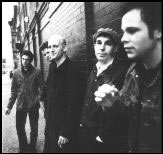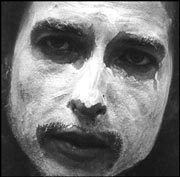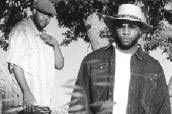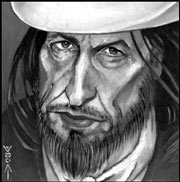RADIO 4
HOT HOT HEAT, AVEO
Paradox Theatre, 524-7677, $8
9 p.m. Sat., July 6
According to Anthony Roman, New York’s arts scene was in desperate shape.
“Have you seen [Glenn O’Brien’s film] Downtown 81?” Roman asks. “It’s this surreal story that follows Jean-Michel Basquiat around the downtown area throughout a 24-hour period, while he tries to sell a painting. And he goes down to the Mudd Club and he hangs with Melle Mel and he meets up with the DNA crew. . . . So he’s in the art world and the rap world and the punk and new wave world—all these different scenes in a single day. Those worlds were interconnected when we first came to New York, but it isn’t really that way anymore. We felt like all the reasons we’d come to the city had disappeared.”
Roman, bassist and keyboardist for Radio 4, loved the city that had become the band’s adopted home. But instead of the thriving crosscurrent collaboration among scenes and media that had characterized it in the 1980s (filmmakers working with musicians, painters with dancers, writers with composers), Roman gradually found that N.Y.C.’s once-connected arts scenes had become sharply segregated.
“They cleaned up downtown,” Roman says wearily, “so everybody ran to Brooklyn.”
Gotham!, Radio 4’s punky, funky second album, is both a record of and a protest against that segregation. Like the New York that Roman wanted to live in, it’s indiscriminating and energetic. And—here’s the kicker—it’s aggressively danceable. Which means a lot in terms of Radio 4’s politics and aesthetics.
Take the music first: Radio 4 makes records for punks who want to dance, for clubbers who want harder cuts, and for kids who like their protest with a soundtrack.
“It’s not exactly original,” says Roman carefully. “It’s not like no one’s ever done this before. But we’re all big fans of bands who’ve tried to make their music work on a few levels. The goal for Gotham! was to make a record that succeeded regardless of how you approached the songs.”
Like The New Song and Dance, the band’s 2000 full-length debut, Gotham! layers punk-pop songcraft with club-dance hall beats and grooves. But for their sophomore effort, Radio 4 hooked up with electronic/rock production team DFA (Tim Goldsworthy and James Murphy).
As fate would have it, that was the final element the band’s sound needed.
“We’d always played a kind of dance-oriented rock anyway,” Roman offers, “but we didn’t have any idea how to augment it technically. Tim and James didn’t change any of the music we’d written”—no remix or dub pyrotechnics here, true—”but they threaded a lot of things into the songs. They did a lot of beat-and-loop work and essentially took what we’d done and gave it a heavier groove.”
What emerges on Gotham! is a kind of updated club/punk crossover, an album that plays as if “Rock the Casbah” and Primal Scream’s Screamadelica were the ur-texts of the last decade of pop music.
Though Radio 4 aren’t exactly mapping uncharted territory, they do have a specific political agenda.
“I was reading this article the other day, in fact,” Roman offers, “where the writer said our lyrics were like the poetry of a 16-year-old with an ‘anarchy’ patch on his backpack. But, shit, there’s no reason to be coy—not in 2002.”
Well, one either likes people to wear their allegiances openly, or one doesn’t. You’ll note Radio 4’s own political bent on tracks like “Start a Fire,” the excellent band showcase “Calling All Enthusiasts,” as well as “Our Town” and “Save Your City” (really, this is such a “New York” album).
But you’ll also find it in the live gigging and venues Radio 4 choose to play. Witness the band’s creative association with No Dancing Allowed, a N.Y.-based organization dedicated to the revision of the city’s Prohibition-era cabaret laws. These are exactly as cabalistic and archaic as you’d expect, allowing city government to fine or shut down live-music dancing venues for obscure and bizarre reasons—occupancy limits, restaurant standards misapplied to clubs, etc.
“Which is really strange,” says Roman, “considering how important nightlife is to the city’s budget, not to mention its culture. Nightlife brings more money into the city than sports; I’ve asked a lot of people why the city would seem so interested in shutting down those places, given that reality, and no one’s been able to give me a straight answer.”
Ah, but there are no straight answers in murky urban politics, and none on the dance floor, either. But Radio 4 seem to appreciate that particular uncertainty.
“It’s hard to tell whether someone is really getting the political part of it,” says Roman. “Some people are just dancing. But I like that. I like that you can get something out of it, no matter how much attention you’re paying.”









